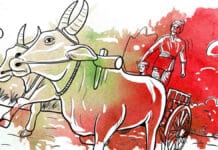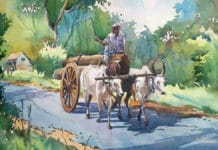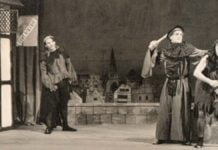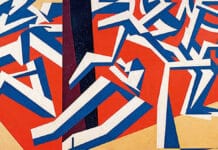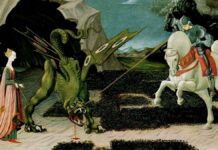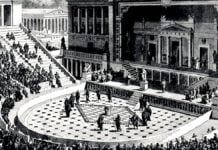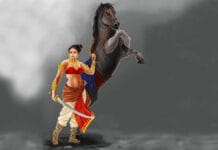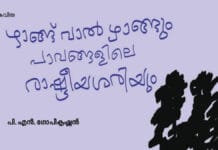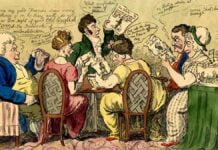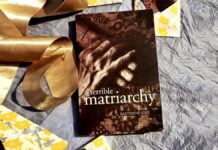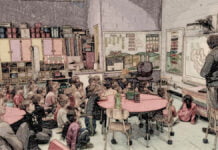Ruskin Bond’s story The Kitemaker presents the differences between the past and present in rural India primarily through the nostalgic recollections of an elderly man. The past differs considerably from the present regarding human relationships, social order, and nationhood. An old man in rural India wonders how the world has changed as his grandson flies a kite nearby. Bond uses natural imagery as a metaphor, with an elderly, gnarled banyan tree representing the grandfather and a youthful, spry mimosa tree representing the grandson’s vigour.
Mehmood is a grandfather who recalls his past life as the title’s kitemaker. He worked for the local chief, or nawab, under the now-dismantled hierarchical social system. They resided in a prominent British colony that has now been divided between India and Pakistan. Kite-making now seems unusual, and Mehmood appreciates the chance to share it with his grandson Ali.

The story begins with Ali, Mehmood’s grandson, bringing his grandfather, the elderly kitemaker, from his reverie after the boy’s kite becomes entangled in the ancient banyan tree’s branches. Ali seeks assistance from his grandfather. Mehmood is too elderly to retrieve or teach Ali how to fly a kite properly, but he builds him a replacement. Ali pledges that he will not lose this one and departs to fly it.
Mehmood reclines beneath the banyan tree, reflecting on his old career as a professional kitemaker. In the past, he recalls, adult men flew kites joyfully. Back then, there was more open space, and the town was less hectic. Men would compete and wager on the outcome. Even the Nawab, the village chief, would pay attention. Mehmood was well-known and respected for his skill as a kitemaker. He once created a magnificent kite for the Nawab that resembled a flying dragon, but it was too harsh for even Mehmood to fly it. Mehmood thinks about how much has changed in the intervening years. The Nawab is no longer alive; his progeny are common folk like Mehmood. He no longer has a patron and is unknown to his neighbours. The speed of life has sped up, and those who live in his community are pressed for time. Moving in lockstep with the sweating mass of humanity, the city has lost its charm, and the gali no longer has broad fields for kite flying but just cramped streets and deteriorating cement structures. The indifference of his neighbours demonstrates the decay of culture and humanity in their pursuit of wealth. The fact that a trash trader has taken over his kite shop adds to the evidence.
One of Mehmood’s sons works in a neighbourhood garage, while the other remains in Pakistan. When India and Pakistan were partitioned, he was on the wrong side of the border and unable to return home. Mehmood appreciates that his other son lives close by since it allows him to watch Ali, his only grandchild, grow up. He takes pleasure in watching Ali perform. He believes Ali is comparable to the mimosa seedling at the courtyard’s edge. They are immature and will develop into tall and muscular adults. Mehmood is akin to the banyan tree behind which he rests. Both are elderly, stooping, with twisted bones and branches. Both are immobile inside the boundaries within which they grew up and hence unable to find their place in the present competitive world -both were taken for granted -permanent fixtures irrelevant to the loud, sweating mass of humans surrounding them.
Mehmood is becoming exhausted and drifts off to his final fantasy; he finds hope in his grandson Ali and dreams of constructing him a beautiful kite that “would resemble the great white bird of the Hindus -Garuda, the famous steed of God Vishnu.” He believes he should have something to leave Ali. He hears Ali calling him, but the youngster’s voice is weak and distant. Ali returns to the banyan tree and comes face to face with his grandfather, who has closed his eyes. On his beard is a small white butterfly. Ali makes an unsuccessful attempt to awaken Mehmood. Fearful, he flees, pleading with his mother for assistance. The butterfly flies from Mehmood’s beard to the mimosa tree, and Ali’s kite soars into the sky. The Garuda imagery adds intensity and pace to the story, as we not only see Mehmood sweep into his beautiful old world, freeing him from the indifference of modern decadence but also as a ray of hope for the young generation to tear themselves free from the ‘sweating mass’ like the kite in the banyan tree.
In The Kitemaker, Ruskin Bond puts forward the themes of tradition, mortality, loneliness, happiness, independence, kindness, pride and change. What is interesting about the story is that Bond seems to be highlighting that the landscape has changed. He may be suggesting that with old age comes loneliness. Though Mehmood is old, he does appear to be relatively independent. There is not anybody in the story that he is reliant on. Mehmood seems to accept life on life’s terms, mainly when he compares the banyan and the mimosa. Symbolically, this could be important as Mehmood is comparing himself to the older banyan tree while realising that just as the mimosa is growing, so too is Ali. It is as though there is a cycle in life, and Mehmood knows that he is at the end of it.
The end of the story is also interesting; when Mehmood dies, the reader realises that he has done so peacefully. He has not been a burden on anyone; if anything, he has brought joy to people, particularly Ali. He has lived a full life and seen the city change. This could be important as Bond may be suggesting or highlighting that India was beginning to prosper when the story was written. Villages became towns, and towns became cities. Yet the traditions that Mehmood had carried through from previous generations seemed lost as people prospered. Something that leaves the reader wondering what price there is to be paid for prosperity.
Change can be good but can also result in the traditions of the past being forgotten, which is very much the case in the story. Nobody left after Mehmood to make kites for Ali or anybody else. With Mehmood’s death comes not only the loss of life but the loss of tradition. Bond puts forth the question of whether the inevitable change should come at the cost of tradition. He also asks whether the past should be forgotten, just as Mehmood will surely be forgotten.







